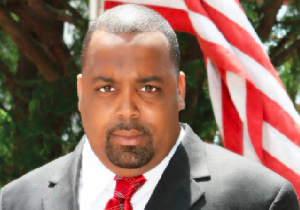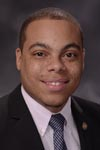JEFFERSON CITY, Mo. — A black Democrat who ran against Rep. Mary Nichols, D-Maryland Heights, in 2012 has decided to run again as a Republican, saying that the Democratic Party “lost their way.”
Paul Berry challenged Nichols in the 2012 Democratic primary. He announced intentions to run again last fall and, on the final day of filing for candidates, filed as a Republican, saying that the state Democratic party stacked the deck against his campaign, and he saw no point in paying the $50 candidate fee to a party that would not support him.
“Why would I want to contribute to a party and pay money to a party that is going to be used in attacks against me?” Berry said. “They won’t give primary challengers access to the voter database, and they have an incumbent protection fund to keep those in office there.”

Berry said the party’s financial support of incumbents and the refusal to give all candidates access to voter information are the reasons it has failed to recruit top candidates. He said the primary process should be free of financial interference from the state party.
“In a year with historically low filing for state rep offices, is it really the best policy to tell a fellow dues-paying Democrat that he shouldn’t run?” Berry said. “I didn’t leave the Democratic party. They left me.”
Roy Temple, Chair of the Missouri Democratic Party, said that the Democratic party tended to support incumbents in general, but there was no dedicated “incumbent protection fund.”
“I’d love to know where this bank account or fund is where we have all this money for incumbents, I’d love to know where it is,” Temple said.
Berry also said the legislative black caucus dropped support for a bill he’d been lobbying and cited his challenge of Nichols as the reason why. Sen. Jamilah Nasheed, D-St. Louis, said she committed to give Berry an opportunity to present his bill to the caucus before she stepped down from her chairmanship earlier this spring. After she stepped down, the meeting never took place.
“I hope it’s not true that the black caucus told him to drop his challenge, because that would be appalling to me,” Nasheed said. “We need to be supporting more black lawmakers regardless of party and bringing more minorities into this body. We shouldn’t put being Democrat before being black.”
Berry claims that after the black caucus pledged to support his bill that he was told by Rep. Michael Butler, D-St. Louis, that the support would only come if he dropped his primary challenge. Butler says Berry has mischaracterized his statements.
“I was speaking to him as a member of the House Democrat Victory Committee and as Rep. Michael Butler,” Butler said. “I didn’t speak on behalf of the caucus, I didn’t intend for him to think I was speaking for the caucus and I even told him it would be up to the chairman to decide these things. I just told him that while I personally liked the bill, I didn’t think I could support it if he was challenging one of my colleagues.”
Butler says he personally supports Berry’s bill, but he advised Berry that it would be difficult to pass a bill while actively challenging a sitting Democrat. Butler asserted that he intended it to be friendly advice, not an ultimatum.
“I told him, ‘which do you want, to pass a bill or get elected?’” Butler said. “I advised him that I thought it would be hard to get bill support if he’s running a challenge against an incumbent. But I never told him the caucus wouldn’t support it, or that he shouldn’t run against her.”

Berry says Butler is lying.
“He told me he was speaking for the caucus, I think he’s just switching hats now because he isn’t supporting my bill,” Berry said.
Butler countered that Berry simply misunderstood his intention.
“I think it’s a good idea, I personally support it, but as a Democrat I do support my fellow members, and I think it’s hard to get the party to support a bill while also running against someone, but I never spoke on behalf of the caucus, I never said what the black caucus would or wouldn’t do.”
Berry, after feeling snubbed by both the black caucus as well as the state party, says he was embraced by Republican party members and has begun pitching his bill, the Missouri Safe Streets Act, to Republican lawmakers. Berry says he now feels that Republicans are more equipped to address the issue.
“I don’t know what my race with Mary has to do with a bill that would help lots of black citizens,” Berry said. “I feel like that should be a separate issue, and I feel like if the Republican party is going to listen to this issue and potentially help me fix this problem, then that’s where my support is.”
Berry has an uphill battle running in a district that is 57 percent Democratic, but says he feels that he can draw much of the Democratic vote. Butler, who added that Berry was “a very smart man,” said he felt some of Berry’s actions were personally motivated.
“He has it out for Mary,” Butler said. “He has it out to beat her, he’s suing her from the last election, he doesn’t like her, and I think that’s driving a lot of his actions.”








